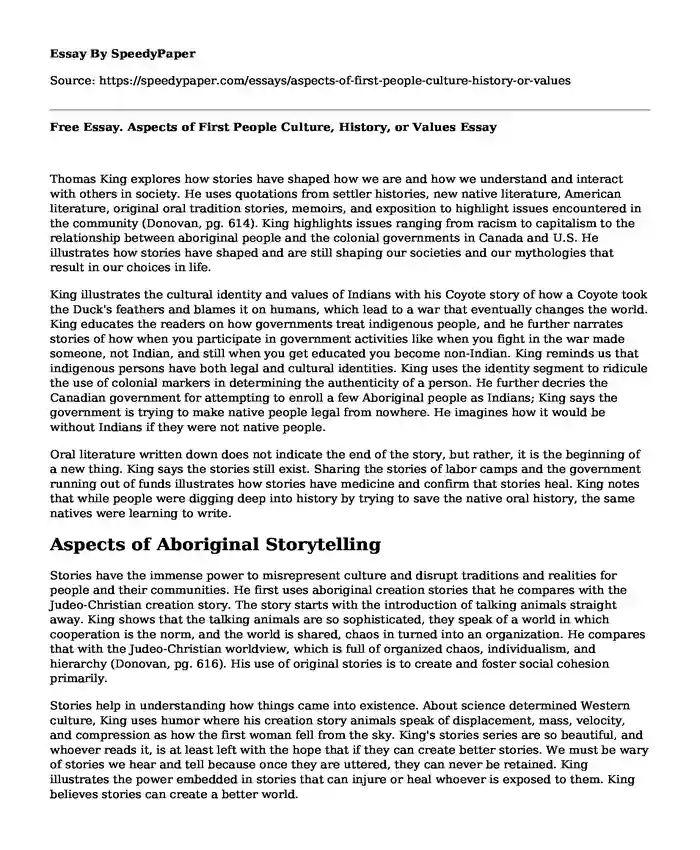
| Type of paper: | Essay |
| Categories: | Culture Human American history |
| Pages: | 3 |
| Wordcount: | 638 words |
Thomas King explores how stories have shaped how we are and how we understand and interact with others in society. He uses quotations from settler histories, new native literature, American literature, original oral tradition stories, memoirs, and exposition to highlight issues encountered in the community (Donovan, pg. 614). King highlights issues ranging from racism to capitalism to the relationship between aboriginal people and the colonial governments in Canada and U.S. He illustrates how stories have shaped and are still shaping our societies and our mythologies that result in our choices in life.
King illustrates the cultural identity and values of Indians with his Coyote story of how a Coyote took the Duck's feathers and blames it on humans, which lead to a war that eventually changes the world. King educates the readers on how governments treat indigenous people, and he further narrates stories of how when you participate in government activities like when you fight in the war made someone, not Indian, and still when you get educated you become non-Indian. King reminds us that indigenous persons have both legal and cultural identities. King uses the identity segment to ridicule the use of colonial markers in determining the authenticity of a person. He further decries the Canadian government for attempting to enroll a few Aboriginal people as Indians; King says the government is trying to make native people legal from nowhere. He imagines how it would be without Indians if they were not native people.
Oral literature written down does not indicate the end of the story, but rather, it is the beginning of a new thing. King says the stories still exist. Sharing the stories of labor camps and the government running out of funds illustrates how stories have medicine and confirm that stories heal. King notes that while people were digging deep into history by trying to save the native oral history, the same natives were learning to write.
Aspects of Aboriginal Storytelling
Stories have the immense power to misrepresent culture and disrupt traditions and realities for people and their communities. He first uses aboriginal creation stories that he compares with the Judeo-Christian creation story. The story starts with the introduction of talking animals straight away. King shows that the talking animals are so sophisticated, they speak of a world in which cooperation is the norm, and the world is shared, chaos in turned into an organization. He compares that with the Judeo-Christian worldview, which is full of organized chaos, individualism, and hierarchy (Donovan, pg. 616). His use of original stories is to create and foster social cohesion primarily.
Stories help in understanding how things came into existence. About science determined Western culture, King uses humor where his creation story animals speak of displacement, mass, velocity, and compression as how the first woman fell from the sky. King's stories series are so beautiful, and whoever reads it, is at least left with the hope that if they can create better stories. We must be wary of stories we hear and tell because once they are uttered, they can never be retained. King illustrates the power embedded in stories that can injure or heal whoever is exposed to them. King believes stories can create a better world.
Stories have different impacts; for instance, in Aboriginal culture, stories do not always have a clear moral center, and not always do they say anything. King gives an example by recalling his favorite story that helped him lead a life with the presence of his failures. The stories he read helped him by encouraging him to keep on living even though he occasionally failed. Indeed stories re understood differently each time they are written or narrated.
Work Cited
Donovan, Michael J. "Aboriginal student stories, the missing voice to guide us towards change". The Australian Educational Researcher 42.5 (2015): 613-625.
https://link.springer.com/article/10.1007/s13384-015-0182-3
Cite this page
Free Essay. Aspects of First People Culture, History, or Values. (2023, Jul 24). Retrieved from https://speedypaper.com/essays/aspects-of-first-people-culture-history-or-values
Request Removal
If you are the original author of this essay and no longer wish to have it published on the SpeedyPaper website, please click below to request its removal:
- Essay Example: Personal Marketing Plan
- Personal Essay Example: Overseas Studying Makes Me Independent
- Christmas in Australia, Free Essay for Students
- My Disneyworld Experience. Essay Example
- Essay Example - "Stroop" Test
- The "Golden Circle" Framework. Essay Sample
- Gender and Popular Culture - Free Essay Example
Popular categories




